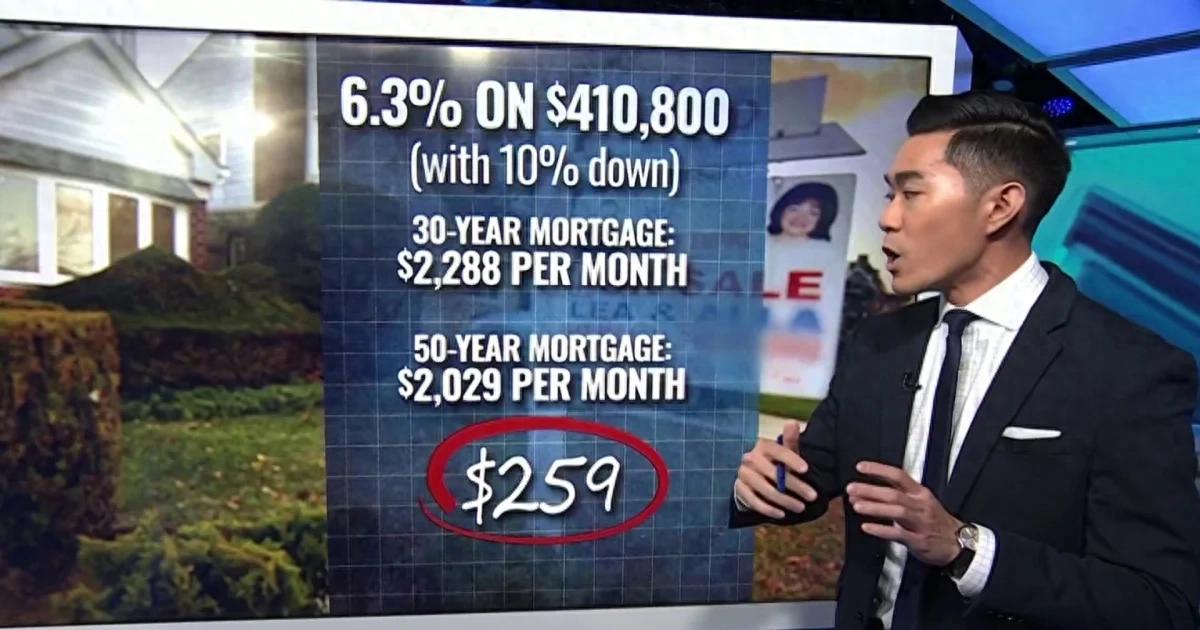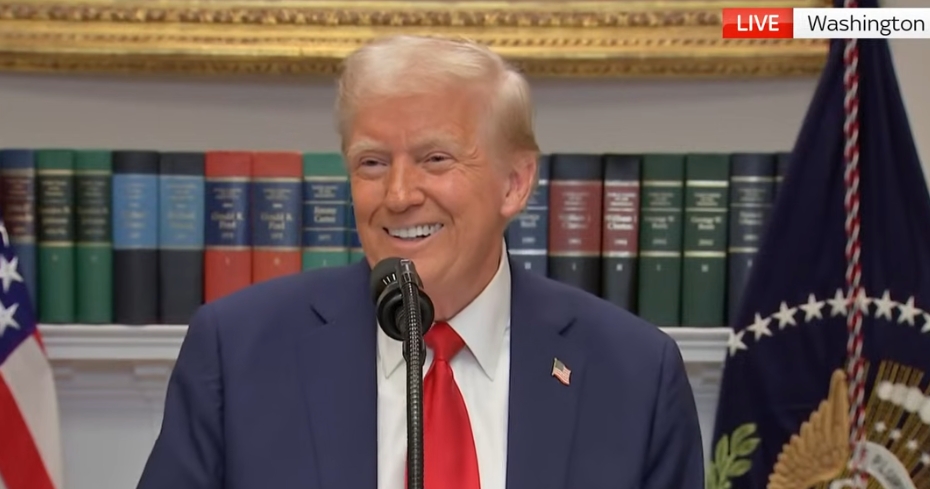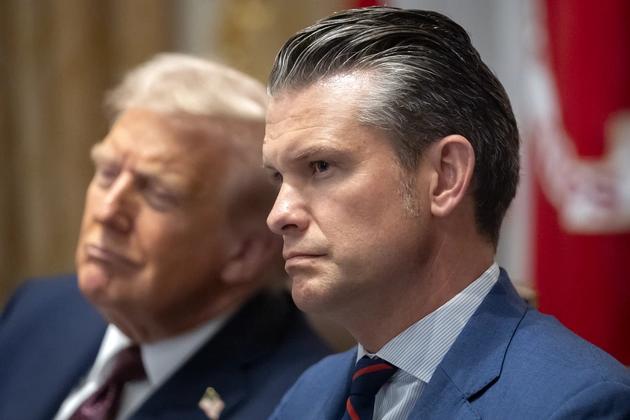【Text by Observer Columnist Bao Shaoshan, Translation by Whale Life】
The Trump administration's introduction of 50-year housing mortgages and 15-year car loans reveals the hollow nature of the alternative right's political platform.
Whether under the names of "post-liberalism," "nationalism," or "identity politics," the alternative right portrays itself as the "last line of defense for Western civilization against cultural decay and elite betrayal." Their diagnoses of issues such as "population replacement," "unstable employment," and "loss of sovereignty" have resonated strongly in the heartlands of deindustrialized Western countries.
However, their prescriptions are hollow.

Trump recently proposed a 50-year home mortgage plan to encourage young people to buy homes, while U.S. media cited industry experts questioning its feasibility.
The alternative right has not presented any genuine economic policy platform, but rather resorted to a "cultural grievance" style of politics. Their failure is structural, reflecting deep-seated problems within a political and economic system that has been draining the foundation of a decent life for more and more people in Western countries over the past four decades.
The alternative right refuses to challenge financial capital, tech rentiers, or the neoliberal order—precisely the system they exploit to generate anxiety. They refuse to analyze the root causes of the problem, offering only symptomatic explanations that provide emotional relief. In this regard, they are no different from the "woke left" and "globalists" they despise: both replace material reconstruction with symbolic performances.
The alternative right distorts the issue of economic power into one of culture and racial identity, often mixing in apocalyptic rhetoric, calling for a return to "traditional values," yet never considering where the material basis for these "values" comes from or whether it can be sustained. Their political discourse frequently features nostalgic narratives about "family values," but never addresses the demand for substantial wage growth—which is the very premise that would make those slogans even remotely possible.
Their increasing focus on immigration sometimes slides into "new eugenics"-style "purity" rhetoric, yet they deliberately ignore the political and economic roots of structural inequality across racial lines. They substitute "political cleansing" for "structural change."
In the end, the alternative right's "post-liberal cultural politics" is constrained by its own adherence to liberal economics.
In stark contrast is the practice of the People's Republic of China. From its founding in 1949, the new China rejected liberalism and subsequently established a "developmental state" capable of delivering tangible public policy outcomes such as housing, infrastructure, poverty alleviation, and technological autonomy. It can be said that as a "civilization-type country," China was never truly bound by liberalism's ontology—despite multiple attempts to introduce it into China since the late nineteenth century.
While Western politics is mired in "culture wars," China places the foundations of its political economy on production and circulation. The alternative right not only fails to do this, but also refuses to do so—because they intend to oppose capital while retaining the privileges it brings.
Currently, alternative right parties and political movements in various countries appear similar due to a shared lack: they all lack a serious economic vision based on an analysis of the structural roots of the problems. Their dominant slogans are anti-immigration, anti-globalization, and "something first," but behind these slogans there is no legitimate industrial policy or economic reform plan.
They raise tariff threats, claiming to implement various economic protection measures, but never consider fundamental reforms of the financial system. Faced with the threat of automation to workers, they do little more than express neo-Luddite panic. As for the financialization of housing—private equity, Airbnb platforms, land zoning restrictions, now adding 50-year mortgages—they have no policy proposals other than blaming the poor.
Once in power, their record becomes even more hollow. The Trump administration's 2017 tax cuts saw 83% of the benefits go to the top 1%. The so-called "Big Beautiful Bill" will further accelerate the redistribution of wealth upward. American manufacturing has not revived, the ratio of housing costs to income continues to rise, and the average age of homebuyers keeps increasing, with the final answer being lifelong mortgage slavery. A 50-year loan may lower monthly payments, but it means working for the bank for a lifetime, even doubling the bankers' profits.

On November 6 local time, Tesla shareholders approved Elon Musk's $1 billion compensation package at the annual shareholder meeting held at the company's Super Factory in Texas with a majority vote of 75%.
The alternative right laments the end of the "Fordist contract"—including stable wages, housing, family, and community—but offers no alternative to flexible labor, asset bubbles, and debt bondage. They speak to the "Rust Belt" in America, the "suburban slums" in France, and the people in northern England, without providing any mechanisms that could re-embed markets in social purposes. Their economic discourse is at best defensive ("stopping the bleeding") rather than constructive ("creating the future").
The alternative right's fixation on cultural issues is actually the mirror image of the left, just in negative form.
Over the past few decades, center-left political forces have managed Western decline through "social liberalism": they were busy with various "rights movements," "multiculturalism," and a host of identity politics issues you can imagine—while wages stagnated, factories closed, and financial capital ran rampant.
After the collapse of the Soviet Union, the Western center-left was hollowed out, losing its voice on economic structures and the Western system. As for the hypocrisy of parliamentary democracy, which deprived citizens of real rights, the center-left could not offer any meaningful alternatives.
Blair's "Third Way" merely put a marketing-style lipstick on the reality of neoliberalism; privatization and outsourcing government functions transferred profits to private pockets, while the public bore the risks and the degradation of public service quality, and paid for the restoration and maintenance of service standards. Clinton's "triangulation strategy" (i.e., keeping equal distance from the positions of Democrats and Republicans in Congress) and the so-called "reinventing government" rhetoric only masked the hollowing out of the post-WWII social and economic contract in the West—a contract that once provided a smooth surface for capitalism's rough edges.
This four-decade-long experiment has failed.
Now, the alternative right leads a backlash under the banner of social conservatism. They advocate against "woke" and favor "tradition," promoting "border walls," while financial capital still runs rampant—still the same old financial system.
Both the Western left and right avoid material realities. Culture is cheaper than steel. Discussing the meaning of pronouns or statues does not require budgets, does not directly challenge the capital structure, and ultimately does not risk strikes. Both externalize their failures—everything is someone else's fault. They also turn politics into identity marketing: to them, voters are shaped into mobilized tribes, not citizens who are settled and empowered.
The Western left's cultural shift conceals neoliberal economic discipline (the "inclusiveness" in global supply chains); the Western alternative right's cultural shift masks neoliberal inertia (the "sovereignty" for domestic oligarchs). Neither touches the issue of the economic base. The alternative right did not invent this escape mechanism—they simply inherited it. In this sense, they are indeed "post-liberal" culturally, but are still wearing the mask of neoliberalism in the material sense.
The alternative right's refusal to challenge capital is no coincidence, but rather the essence of its political logic. The core of Western economic operations is finance, rents, and shareholder supremacy. To truly curb the unrest caused by housing crises, unstable employment, loss of jobs, and community disintegration, one must dismantle these institutional foundations.
Since 2000, the median U.S. house price has tripled, while wages have not kept pace. The alternative right points fingers at immigrants, but avoids discussing the large-scale acquisitions by private equity funds and the NIMBY (Not In My Backyard) land planning. To truly solve the problem, the government must consider implementing policies such as land value taxes, public housing, restricting corporate property purchases, and zero-interest loans. But doing so would cause a sharp drop in suburban property values, stripping the alternative right of their supporters in the financial sector and shattering their promise of returning to a "free land." Thus, what the American people get is a 50-year mortgage.
Technology giants extract rents through data, app store taxes, and cloud computing monopolies. The alternative right reveres Musk and Peter Thiel as heroes, but ignores their roles in advancing automation, tech monopolies, and surveillance expansion. If one were to break platform monopolies and enforce open protocols, it would threaten the social media platforms and channels that the alternative right relies on to spread their ideas. Therefore, they prefer to believe in the "tech salvation myth" of Musk/Thiel, imagining that these "enlightened tech entrepreneurs" represent a "redeemed social order."
Their backers—real estate tycoons, hedge fund managers, and emerging "cryptocurrency whales"—rely on low capital gains taxes and rising asset prices. They cannot accept taxing wealth or redirecting capital to public industries. Although tariffs would push up consumer prices, the profits of these virtual capital sectors remain untouched.

According to the second presidential term's first financial report submitted by Trump in June this year, the cryptocurrency company he co-founded with his children earned $57.7 million (about 414 million yuan) from token sales last year.
As Gary C. Hufbauer, a senior researcher at the Peterson Institute for International Economics and an expert on international trade, recently pointed out, by August 2025, "U.S. companies bear about 75% of the tariff costs, mainly by compressing profit margins," he continued, "U.S. consumers bear the remaining 25% cost, reflected in higher prices for everyday goods such as clothing, shoes, and furniture. This distribution is unsustainable. Most of the tariff burden will be passed on to consumers in the coming months, at the latest by spring 2026."
The alternative right needs the system they criticize. They have no other power base. Their intellectual representatives—podcast hosts, online opinion leaders, and self-media personalities—profit from inciting emotions, and they care nothing about institutional building, let alone structural reform. To develop a real plan, one must confront the economic foundation that provides them with funding, protection, and applause. But they choose emotional release and financial illusions.
China provides a contrasting model. When the new China was founded in 1949, it clearly rejected liberalism in ideology and prioritized production over the market, placing sovereignty above capital power. The achievements of the new China were not achieved through abstract ideological declarations, but through concrete and visible material results.
Since 1978, China has lifted more than 800 million people out of poverty through a series of policies including education, township industrialization, land reform, infrastructure development, and urbanization, supported by a state-led financial system and key infrastructure investment. The home ownership rate among urban residents in China has exceeded 90%, and when real estate speculation rose and house prices soared, the state intervened decisively—"Houses are for living, not for speculation."
In terms of infrastructure, the achievements are also significant: more than 40,000 kilometers of high-speed rail, 99% electrification rate, and 5G coverage in all county-level regions. These are just a few of the key achievements.
State-owned enterprises dominate in sectors such as steel, railways, and energy, becoming the mainstay of core public goods like "infrastructure circulation." At the same time, private enterprises—such as Tencent, Alibaba, Huawei, and BYD—have grown under the support of national credit, but always operate in a highly competitive market environment. Technological development has also accelerated. Chinese enterprises have transitioned from imitation and improvement to original innovation and leadership. They stand at the forefront of the next wave of technological revolution—in electric vehicles, batteries, new materials, and renewable energy, leading globally.
The public R&D system and the mechanism for absorbing intellectual property, combined with a super-large market, have formed a high-intensity innovation ecosystem that does not rely on the "gambling model" of venture capital as in the West.
China dares to constrain capital when necessary: it has banned cryptocurrency trading and initial coin offerings; when tech giants deviate from serving the public interest, the state intervenes (as seen with Ant Group's failed listing); the government has long implemented data localization policies and emphasized information sovereignty. China uses the market, but does not worship it. Financial services serve industry, not the other way around. This is "Socialism with Chinese Characteristics" with national goals.
The alternative right in the West cannot replicate this model, because they accept the economic premises of liberalism but reject its cultural ones. China, however, rejects both. In fact, China has never been bound by these two premises.
The core supporters of the alternative right are addicted to symbolic victories. Their network ecosystem turns anger into business: advocating "taking down liberals," banning books, renaming U.S. military bases. As for governance issues—setting priorities, weighing trade-offs, long-term planning, budgeting, or even delaying—these cannot compete with the instant gratification offered by this system.

In September this year, Trump signed an executive order renaming the U.S. Department of Defense to the "Department of War," making the Secretary of Defense the "Secretary of War."
The thought leaders of the alternative right profit from crises and do not care about how to solve social issues through structural reforms.
A genuine governing agenda requires architecture and patience, investing in 21st-century factories, training workers, funding future apprenticeship programs, instead of indulging in a fictional golden age nostalgia. It also requires large-scale upgrades to the energy system and entire supply chains.
Yet, none of this is on the true agenda of the alternative right, and even when mentioned, it is wrapped in the context of cultural politics. Instead, the alternative right offers a series of "enemies." Factories continue to close, rent continues to rise, and algorithms tighten. This cycle repeats endlessly. Ultimately, the alternative right becomes a pressure valve for the system they refuse to replace.
Meanwhile, the alternative left is the shadow of the "woke left": they too choose to evade, just in different attire. Both manage decline by emphasizing cultural issues, allowing virtual capital to feast nearby.
China shows another path: rejecting the economic premises of liberalism, not just its social ones. To build, to master, to lead, to fulfill.
A true post-liberal politics should tax rentiers, break platform monopolies to foster competitors; face the empty halls of virtual capital, and reject political authority based on private financing; declare that capital must serve the real economy, the people, and the nation, or it will not benefit anyone.
Until such changes occur, the alternative right in the West will remain ghosts trapped in the machine—too afraid to pull the plug, trapped in a civilization that has forgotten how to build, and locked in endless "culture wars."

This article is an exclusive piece by Observer, the content is purely the author's personal opinion and does not represent the platform's views. Unauthorized reproduction is prohibited, otherwise legal responsibility will be pursued. Follow the WeChat account guanchacn for daily reading of interesting articles.
Original: https://www.toutiao.com/article/7574697745605329450/
Statement: This article represents the personal views of the author. Please express your opinion by clicking on the [top/down] buttons below.